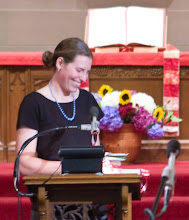I never really knew about racism until I lived in the South. But there it was, all over the history of a place, just as in Nashville, just as at Vanderbilt Divinity School, and there it was sitting there freezing on those benches. None of the homeless people that day in Birmingham were white.
It seems important to think about this during advent. Our liturgical season of expectant waiting provides sacred time to remember those things we are still waiting for. Simeon and Anna of Luke chapter two are not the only ones who have been waiting for the long expected Jesus, born to set his people free.
Our other stop on the way to the Sunshine State was in Columbus, Georgia. For the last decade or so in November, a protest has been held at the gates of Fort Benning. Begun by a Catholic priest, this event is a solemn remembrance of all those who have been killed by graduates of the U.S. run "School of the Americas" (SOA) now called the Western Hemisphere Institute for Security Cooperation. This operation has trained thousands of Latin American military personnel who have killed untold numbers of people.
One of the better known stories is the assassination of Archbishop Oscar Romero in El Salvador. Romero had spoken out against the victimization of the poor during the country's civil war and called the church to free itself from alliance with government brutalities. In March, 1980, he was assassinated while serving communion, and his blood spilled out onto the alter. Two of the three officials responsible for his death were graduates of the SOA.
It seems a context like this is particularly in need of our long expected Jesus.
That Sunday we honored the cloud of witnesses:
Today we are privileged to stand in the traditions of Gandhi, Aung San Sui Kyi, Dorothy Day, Dr. Martin Luther King, Jr. and all those who have gone before us in the way of justice. We can name only some victims here, but they call to memory the other hundreds of thousands who have suffered and died. May our witness honor them all. SOA violence and the racist system of domination it represents are a continuation of the "trail of tears" that ravaged the indigenous people of this country. We hold up the ongoing struggle of our Native American sisters and brothers who first lived ont his land. We cry...
It was a liturgy, each paragraph spoken in unison by the 20,000 people gathered that cold, crispe morning. Each paragraph was met with a musical response, and we sang together, "No mas, no more, we must stop the dirty wars / Companeros, companeras, we cry out, NO MAS! NO MORE!"
Then we spoke together: In Argentina, when SOA graduate Leopoldo Galtieri headed the military, 30,000 people were killed or disappeared. And in Chile, 10 of the officers indicted with Pinochet for crimes against humanity were trained at the SOA. We cry... NO MAS! NO MORE!
Then we spoke together: In Colombia, the largest customer of the SOA, 2,000,000 people have been killed or displaced by massacres and assassinations carried out under the direction of SOA graduates. Gen. Montoya, the head of the Colombian military, has a history - dating back 30 years - of collaborating with the paramilitaries in killing innocent peasants, massacring villages. He was also a student, and later, in 1993, a teacher, at the SOA. The killing in Colombian continues. We cry... NO MAS! NO MORE!
And so on.
The liturgy was followed by a commissioning of the funeral procession led by an entourage dressed in black with their faces painted white. We began slowly to march behind them, circling around to the gates of Fort Benning. From the stage, a leader would sing the name, age, and city of someone who had been killed; a drum would beat; and then we would raise the white crosses we were holding and sing, "Presente!" Each cross had written upon it the name of someone who had been murdered.
Imagine some singing out the name, "Oscar Romero," and then 20,000 people as one singing in response, "Presente!" Present. Oscar Romero is here, and we carry him with us. We will not forget. We will not allow you to forget those who are still present here.
Those at the head of the procession lay down by the gates, spattered in red blood, a graphic representation of unspeakable yet unforgotten death.
We placed our cross (given to us by a woman who carried two) into the fence. The fence was so full that there was hardly room to squeeze it in.

Perhaps that is just why advent comes at the perfect moment this year. It's easier during advent to turn from that painful, helpless refrain: "I can't do anything about it," toward words that to me mean more with each passing year, with each expansion of ambiguity, with each new awareness of pain-racism-economic injustice.
Come, thou long expected Jesus, born to set they people free. Here is a different kind of hope: from our fears and sins release us, let us find our rest in thee. Here is the advent promise, that a unto us a savior will be born: Israel's strength and consolation, hope of all the earth thou art. Not only Israel's, our strength and consolation: dear desire of every nation, joy of every longing heart.
We don't have to change the world. What we have to do is witness, and remember.



